Background
Joseph Halevi Horowitz Weiler was born on 2 September 1951, in Johannesburg, South Africa.

Giorgio Napolitano and Joseph H.H. Weiler.
Giorgio Napolitano, Joseph H.H. Weiler and Pasquale Ferrara.
School of Theology and Religious Studies - Catholic University CUA Awards Honorary Degree to Professor Joseph Weiler.
Falmer, Brighton BN1 9RH, UK
Weiler received a Bachelor of Arts from the University of Sussex, in 1976.
The Old Schools, Trinity Lane, Cambridge CB2 1TN, United Kingdom
In 1977, Weiler received a Bachelor of Laws from Cambridge University and Master of Laws in 1982.
Carnegieplein 2, 2517 KJ Den Haag, Netherlands
In 1978, Weiler obtained a Diploma in International Law at Hague Academy.
Quai du Seujet 18, 1201 Genève, Switzerland
Weiler obtained a Ph.D. at European University in 1982.












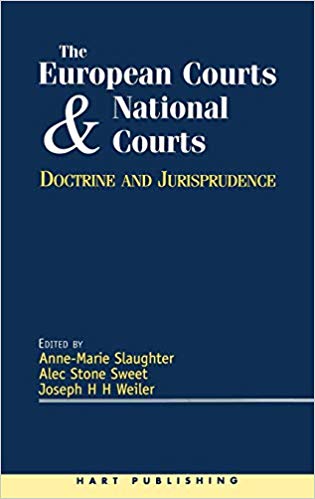
(The essays comprising this volume are the outcome of a ma...)
The essays comprising this volume are the outcome of a major and unique project which looks in detail at the application of EC law by national courts and the interaction of the demands of EC law with the constraints imposed by national legal orders and, especially, national constitutional orders. The volume comprises seven country studies which are shaped around a common research protocol.
https://www.amazon.com/European-Courts-National-Doctrine-Jurisprudence/dp/1901362264/?tag=2022091-20
1998
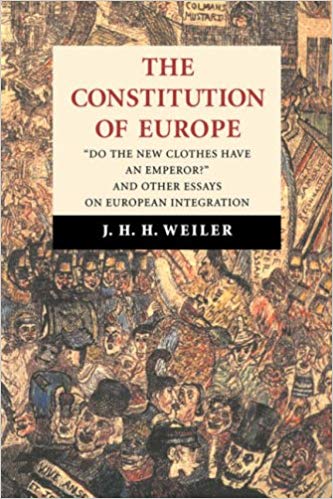
(In a series of highly accessible discussions concerning t...)
In a series of highly accessible discussions concerning the legal framework of the European Communities and the European Union, Joseph Weiler describes the gradual strengthening of transnational European institutions at the expense of national legislators. The Constitution of Europe thus provides from a legal perspective a balanced and uniquely authoritative critique of the attractions and demerits of the goal of European integration.
https://www.amazon.com/Constitution-Europe-Clothes-European-Integration/dp/0521584736/?tag=2022091-20
1998
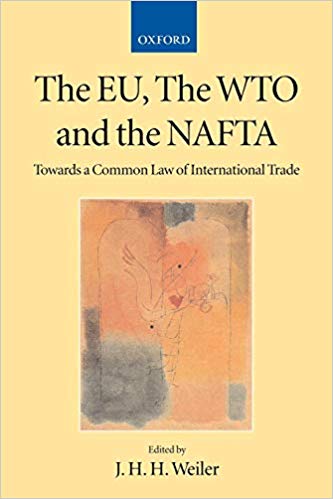
(Based on a recent series of courses at the Academy of Eur...)
Based on a recent series of courses at the Academy of European Law in Florence, this volume addresses the overlapping regulatory trade regimes of the WTO, the EU, and the NAFTA.
https://www.amazon.com/EU-WTO-NAFTA-International-Collected/dp/0199248125/?tag=2022091-20
2001
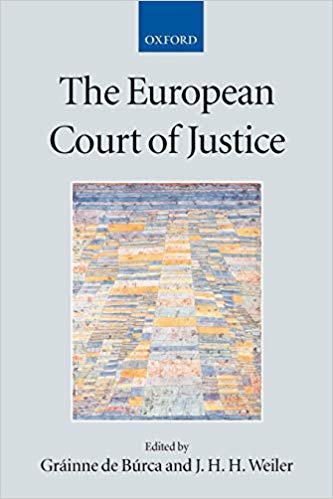
(This collection of essays examines an institution that co...)
This collection of essays examines an institution that continues to be of central importance to students and scholars of European Union law and policy. The essays develop new avenues of analysis and perspectives, including a philosophical, a sociological and a gender-based analysis.
https://www.amazon.com/European-Justice-Collected-Courses-Academy/dp/0199246017/?tag=2022091-20
2002
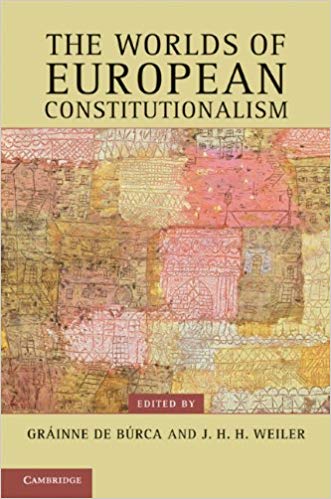
(The idea of the EU as a constitutional order has recently...)
The idea of the EU as a constitutional order has recently taken on renewed life, as the Court of Justice declared the primacy of EU law not just over national constitutions but also over the international legal order, including the UN Charter. This book explores the nature and character of EU legal and political authority, and the complex analytical and normative questions which the notion of European constitutionalism raises, in both the EU's internal and its external relations.
https://www.amazon.com/Worlds-European-Constitutionalism-Contemporary-Politics-ebook/dp/B007CGROWW/?tag=2022091-20
2011
Joseph Halevi Horowitz Weiler was born on 2 September 1951, in Johannesburg, South Africa.
Weiler received a Bachelor of Arts from the University of Sussex, in 1976. In 1977, he received a Bachelor of Laws from Cambridge University and a Master of Laws in 1982. In 1978, Weiler obtained a Diploma in International Law at Hague Academy and a Ph.D. at European University in 1982.
From 1978 to 1985, Weiler was a member of the Department of Law at the European University Institute, Florence, and co-founded its Academy of European Law in 1989. He later served as Professor of Law at the University of Michigan Law School (1985-1992) and as Manley Hudson Professor and Jean Monnet Chair at Harvard Law School (1992-2001). From 1991 to 1992, he was a visiting professor at Harvard University in Cambridge, Massachusetts, United States, and then, he became a professor there from 1992 to 1994.
Weiler served as a member of the Committee of Jurists of the Institutional Affairs Committee of the European Parliament, co-drafting the European Parliament's Declaration of Human Rights and Freedoms and Parliament's input to the Maastricht Inter-intergovernmental Conference. He is a WTO and NAFTA Panelist, and a founding editor of the European Journal of International Law, the European Law Journal, and the World Trade Review.
Weiler is author of articles and books in the fields of international, comparative, and European law. His publications include: Un’Europa Cristiana (Rizzoli, 2003 - translations into German, Polish, Spanish, Portuguese, Slovenian, French, Hungarian, Dutch); European Constitutionalism Beyond the State. Edited with Marlene Wind, (Cambridge Univ. Press, 2003); Integration in an Expanding European Union: Reassessing the Fundamentals. Edited with Ian Begg and John Peterson, (Blackwell Publishing, 2003); Constitution of Europe - do the New Clothes have an Emperor? (Cambridge Univ. Press, 1998 - translations into Spanish, Italian, German, Slovenian, Japanese, Chinese, Greek, Serbian, Portuguese, Romanian in print or in preparation); The EU, the WTO, and the NAFTA: Towards a Common Law of International Trade?
Weiler is an honorary Professor at University College, London; Honorary Professor at the Department of Political Science, University of Copenhagen; and Co-Director of the Academy of International Trade Law in Macao, China. He is recipient of Doctorates Honoris Causa from London University, from Sussex University, from the University of Macerata, Italy and from the University of Edinburgh and is Honorary Member of the Senate of the University of Ljubljana.
He is a founding Editor of the European Journal of International Law, of the European Law Journal and of the World Trade Review.
(The essays comprising this volume are the outcome of a ma...)
1998(In a series of highly accessible discussions concerning t...)
1998(The idea of the EU as a constitutional order has recently...)
2011(Based on a recent series of courses at the Academy of Eur...)
2001(This collection of essays examines an institution that co...)
2002Weiler's research focus is on issues of European integration, globalization and democracy.
Weiler is a Fellow of the American Academy of Arts.
Weiler was a defendant in a criminal libel action brought in the French courts by Dr Karin Calvo-Goller of the Academic Center of Law and Business concerning a review of her book, The Trial Proceedings of the International Criminal Court. ICTY and ICTR Precedents (Martinus Nijhoff, 2006) that appeared on the Global Law Books website that Weiler edits. The review was written by Professor Thomas Weigend of the University of Cologne, and Calvo-Goller contended that it was libelous. Upon complaint by Calvo-Goller, Weiler declined to remove the review from the website and Calvo-Goller subsequently filed suit.
The suit was notable for the issues that it raised concerning the balance between academic freedom and the rights of those who consider themselves to have been libeled. The case was heard by Tribunal de Grand Instance de Paris on January 20, 2011, with the verdict handed down in Paris on March 3, 2011, dismissing the lawsuit.
In its verdict, the Paris Tribunal said it had no jurisdiction in the case since Calvo-Goller did not bring proof by a court-appointed clerk that the book review website was visible in French territory the day or before the day she brought the case to the dean of the investigating judges in Paris. The Paris Tribunal also declared that the words used by Weigend did not constitute libel and were within the limits of free critical book review speech. The court said his words in the review were measured, and the court therefore dismissed the case. An appeal might be pending. The court stated that Calvo-Goller's bad faith in bringing the action was clearly established, and on that basis she was ordered to pay 8,000 euros (around US$10.000 ) in damages to Dr Weiler.
